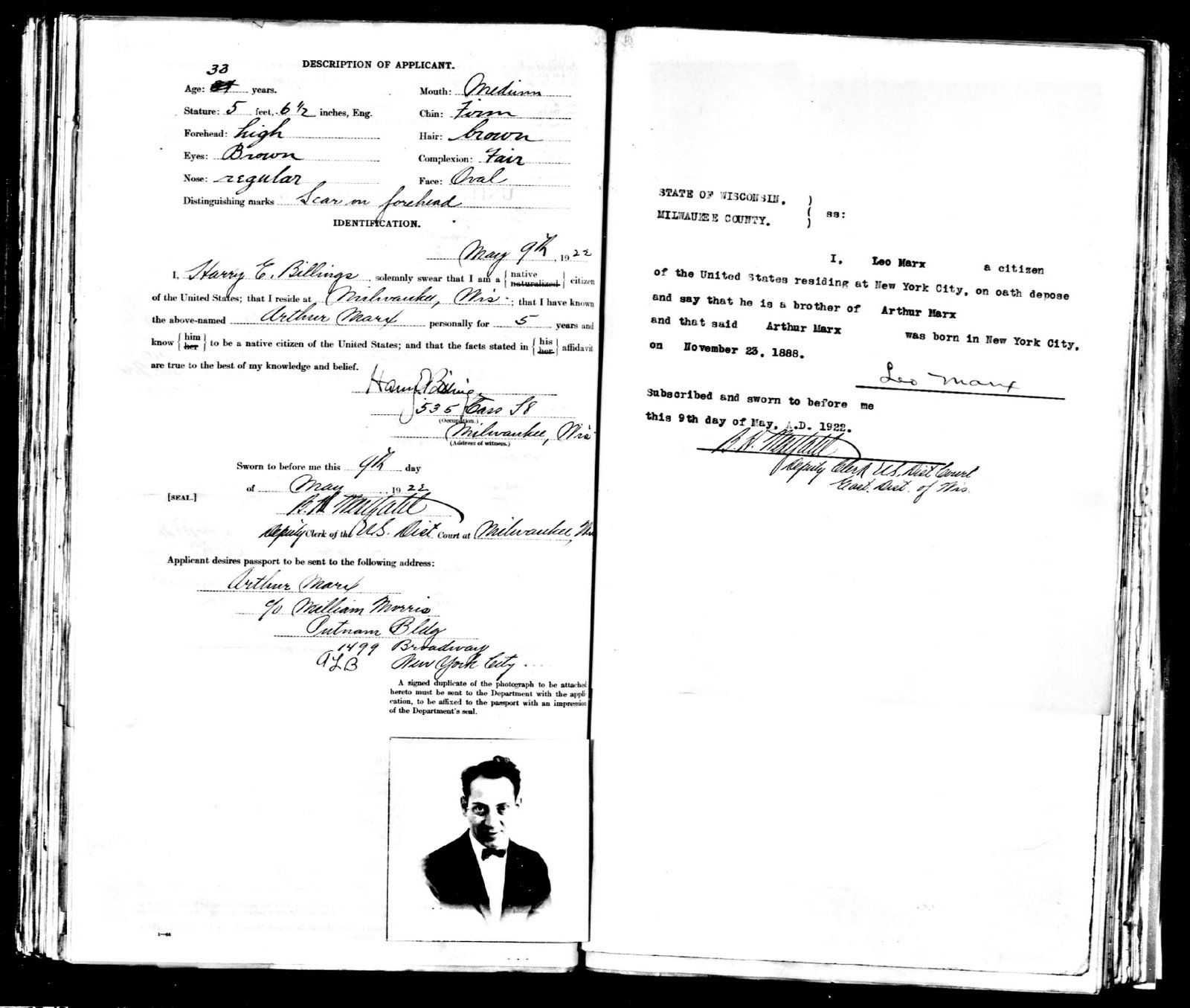
Harpo Marx, the silent, curly-haired imp of the legendary Marx Brothers, remains one of the most instantly recognizable figures in comedic history. His on-screen persona—a chaotic, mischievous, and perpetually mute force—was a masterclass in visual comedy. Communicating through honks and expressive pantomime, this character etched itself deeply into public consciousness. Yet, beneath this boisterous facade lay a life marked by profound struggles, unexpected twists, and a quiet depth that belied his vibrant performances.
The prevailing image of Harpo as the “wild child” of the Golden Era offers only a glimpse into the multifaceted individual named Arthur Marx (born Adolph Marx). His journey from the dire poverty of turn-of-the-century New York to the glittering heights of Hollywood was anything but straightforward. It was paved with personal traumas, unconventional choices, and a resilience that shaped both the man and his iconic character. His enduring smile, a signature element, often masked a lifetime of pain and experiences more complex than audiences ever imagined.
This exploration will delve into the formative experiences that forged Harpo’s unique path. We will examine the crucible of his difficult childhood and the curious genesis of his stage persona. We will also touch upon the poignant personal losses that influenced his most profound relationships. By meticulously examining the layers of his early life, we begin to understand the intricate tapestry of a man who found his voice, paradoxically, in silence, and whose outward merriment often served as a profound testament to an inner world of unexpected pain and unwavering spirit.

1. **A Challenged Childhood and Early Escape** Arthur “Harpo” Marx’s early years were far from the privileged childhood one might associate with a future Hollywood icon. Born in Manhattan in 1888, his family—including his famous brothers Groucho and Chico—were “dirt poor in turn-of-the-century New York.” This pervasive poverty cast a long shadow over his youth, forcing him and his siblings into a relentless pursuit of income from an astonishingly young age. Their “domineering mother Minnie” orchestrated this, pushing them “to start scraping together pennies from almost the moment they could talk.” This established a pattern of survival that would define much of Harpo’s early life.
Minnie Marx’s ambition led to their involuntary induction into performance, a deeply traumatic decision for young Harpo. She organized a singing quartet, and in desperation, “recruited the young Harpo to come up on stage at the eleventh hour, pushing the shy boy into the spotlight.” This impromptu debut was, by all accounts, mortifying. Overcome by nerves, Harpo “wet his pants in the middle of the performance,” a profoundly humiliating moment. This set a distressing precedent for his early encounters with public life.
His struggles extended beyond the stage. During his second grade, Harpo faced “relentless bullying due to his Jewish ethnicity,” a cruelty that escalated dangerously. His tormentors reportedly enjoyed “throwing him out the window of their second-story classroom whenever their teacher left.” This persecution became unbearable. After yet another such incident, the young Harpo simply “walked home rather than returning to class,” ending his formal education at eight. He never returned, marking a premature entry into the harsh realities of independent survival.
This abrupt departure from school plunged Harpo into a “harrowing chapter” as a juvenile delinquent. He became a fixture on New York streets, “roaming for hours a day, swiping whatever odds and ends he could get his hands on.” This period saw him forge unlikely connections and rivalries with “members of various street gangs.” He even “played piano in a brothel during this time,” a testament to desperate survival measures. These gritty experiences, though challenging, sharpened his observational skills and instilled a unique resilience.
Read more about: Traversing the Abyss: Unmasking 9 Notorious Psychopaths Who Shook the World

2. **The Unconventional Birth of the Marx Brothers** The genesis of the Marx Brothers’ legendary act, far from a deliberate comedic endeavor, was born out of Minnie Marx’s persistent ambition. She aimed to create a vaudeville singing group, and initially, “they never actually set out to be a comedy act.” Minnie, ever the matriarchal force, “chastised them and insisted that they stuck strictly to music” whenever the brothers veered into their natural comedic inclinations. This strict adherence to a musical format, paradoxically, fueled the “prankish anarchy the comedy group became famous for.”
By the early 1910s, the brothers began refining their unique stage act. This culminated in their first collaborative film, 1929’s *The Cocoanuts*. This cinematic debut featured Groucho, Harpo, Chico, and Zeppo Marx, embodying their emerging personas. *The Cocoanuts* was not merely a milestone; it was also a “newfangled talkie” and notably, “one of the first films to have an overhead perspective shot,” years before Busby Berkeley. This pioneering innovation underscored the spirit surrounding the Marx Brothers’ early work.
Prior to *The Cocoanuts*, Harpo had already made a solo screen appearance in the 1925 film *Too Many Kisses*, playing the “Village Peter Pan.” This lesser-known role is historically significant because it contained “the only line he would ever speak on-camera in a film: ‘You sure you can’t move?'” This line appeared only as moving lips with a title card, as *Too Many Kisses* was a silent film. This early foray into cinema foreshadowed his eventual iconic silence.
_-_Museo_scienza_e_tecnologia_Milano.jpg)
3. **The Enigma of His Silence** Harpo’s defining characteristic—his utter silence—became his most iconic and enigmatic trait. Early on, “Harpo developed one distinguishing feature in the sibling act: He never talked.” His cinematic career largely depended on “sight gags,” particularly his uncanny ability to produce “extremely unlikely objects from his nearly ever-present overcoat.” This visual approach was remarkably effective, quickly making the Marx Brothers “the talk of Hollywood” and allowing Harpo to leverage his unique persona. The absence of dialogue amplified his physical comedy.
The reasons behind Harpo’s enduring silence are subject to various compelling narratives. One popular account suggests a pragmatic origin: “According to some, it’s because when they were first starting out in Vaudeville, the brothers had a stomach-dropping realization: Harpo had intense difficulty memorizing lines.” Faced with this impediment, the solution was not to remedy the “shortcoming” but to ingeniously transform it. They opted to “simply make his character mute and have his comedy focus on pantomime.” This decision, born of necessity, ultimately unlocked a powerful and distinctive comedic style.
Another, perhaps more psychologically insightful, explanation posits that Harpo’s silence stemmed from profound insecurity. This theory suggests his lapse into muteness came “not so much out of a canny choice, but rather because of a scathing review that he took to heart.” A critic, after witnessing an early performance, reportedly observed Harpo achieved his “foolish character” effect “until he spoke.” This harsh commentary, according to this narrative, deeply affected the sensitive performer, leading him to “fall silent from then on.”
While famously mute in his Marx Brothers films, exceptions exist regarding Harpo’s silence. Some believe he “did once let his voice slip” in *1939’s At The Circus*, shouting “Ah-choo!” Though possibly dubbed, it remains a point of fascination. Furthermore, an earlier instance in a silent movie, *Too Many Kisses*, saw him “soundlessly mouthing the words, ‘You sure you can’t move?'” These rare instances only underscored the powerful impact of his otherwise unwavering commitment to wordless performance.
Read more about: 12 Famous People Who Used Social Media to Launch Their Career: How Viral Moments Led to Stardom

4. **Navigating Romance Post-Tragedy** In the aftermath of his devastating loss, Harpo adopted a pragmatic approach to his romantic life, consciously avoiding deep emotional entanglement. His famous silence did not prevent him from “charming the skirts off of women.” He found solace, or distraction, in relationships that provided entertainment rather than profound connection. He dated “fellow comedian Fanny Brice,” pursuing the relationship “because he felt she would be entertaining, and he loved to be entertained.” This assessment revealed his defensive mechanism: seeking superficial engagement, largely “to not think about his dead girlfriend.”
Despite his efforts to maintain detachment, Hollywood inevitably presented new romantic entanglements. Even as he dated Brice, Harpo, like many “Hollywood hotshot[s],” possessed a “wandering eye,” hinting at a restlessness and underlying search for something more. This inherent curiosity about human connection, coupled with his theatrical public life, set the stage for an encounter that would dramatically alter the trajectory of his carefully constructed emotional detachment. It introduced an unexpected force into his seemingly controlled romantic landscape.
This pivotal shift occurred during a “fateful dinner party” at producer Samuel Goldwyn’s house. Harpo attended with Fanny Brice, oblivious that “his life was about to change.” His other seatmate was “the starlet Susan Fleming, a former saucy Ziegfield girl and a currently reluctant actress who hated making films.” Fleming, astute and determined, had her sights set on Harpo, and possessed “a secret weapon” that would penetrate his emotional defenses. This seemingly ordinary social event thus became the unexpected crucible for a romance that would challenge Harpo’s guarded heart.

5. **A Reluctant Groom, A Secret Wedding** Susan Fleming’s profound admiration for Harpo transcended a mere crush; it escalated into an all-consuming “obsession.” Having little interest in her own film career, Fleming dedicated “four years chasing after Harpo with an intensity and single-mindedness that would probably make anyone take a step back.” Her unwavering pursuit was a testament to her conviction that Harpo was the man for her.
So certain was Fleming of their destiny that she took the audacious step of proposing marriage—an act “near unthinkable for a woman at the time.” Her bold gesture, however, met with a “cruel surprise.” Despite his continued desire for a relationship, “the wounded man turned Fleming down.” Yet, this initial rebuff did not deter her. Instead, she “turned the dial up to 11,” demonstrating a relentless resolve.
Fleming’s persistence was truly remarkable. Undeterred by the first rejection, she “got down on one knee again some time later, and received yet another brutal rebuff.” Her unwavering commitment was evident in her willingness to face repeated disappointment. Finally, she asked him an “incredible third time,” and this time, “perhaps worn down at last, Harpo finally accepted.” This acceptance, born out of her devotion and his eventual capitulation, marked a turning point.
Harpo’s lingering uncertainty was starkly evident in the clandestine nature of their wedding; he married her “in complete secret.” While the couple was “notoriously camera shy,” the true extent of his reticence was revealed by a glaring omission: Harpo “didn’t even tell his brothers it was happening until after the fact.” This deliberate secrecy, keeping even his closest family in the dark, hinted at a profound internal conflict regarding his decision to marry.
The news of Harpo’s top-secret nuptials surfaced almost immediately, and from an unexpected source: “None other than President Franklin Roosevelt heard about the event from a mutual friend, and inadvertently leaked the secret by publicly sending Marx a congratulatory telegram.” This unwitting disclosure added a touch of high-profile absurdity to Harpo’s private affair. It ensured his attempts at secrecy were thoroughly undermined by the public nature of his fame.

6. **The Domestic World of Harpo and Susan** The early days of Harpo’s marriage to Susan Fleming appeared to settle into an idyllic rhythm. Fleming, true to her long-held desire, “quit acting in films like she had wanted to all along,” finding fulfillment outside Hollywood. Together, they embarked on parenthood, “beginning raising a brood of adopted children,” fulfilling a shared vision of a large family. Harpo himself once famously quipped that he desired “So many that whenever we go out, there can be one in every window, waving to us.”
However, their marital dynamic, when viewed through a modern lens, possessed certain aspects that “would still make a lot of us squirm.” Fleming, in a remarkable act of devotion, became Harpo’s “self-appointed ‘valet’ during the union.” She was “basically acting as his assistant when they were at home or abroad.” This arrangement, while functional for them, paints a picture where traditional gender roles were embraced and exaggerated, with Fleming dedicating herself to supporting Harpo’s every need.
Despite these unconventional aspects, Harpo and Susan Fleming’s marriage proved remarkably resilient in transient Hollywood. Against all odds, they “shared a long, happy life together,” demonstrating a profound connection that defied initial reluctance and secrecy. Their enduring bond and shared joy in raising their family underscored a partnership built on mutual affection and unwavering commitment. Their journey, from persistent courtship to lasting domesticity, became a testament to enduring love.
Harpo’s life, rich with comedy and complexity, concluded in a manner imbued with his characteristic sense of timing. He passed away “on September 28, 1964, at the ripe old age of 75,” leaving behind his devoted wife, four children, and his legendary brothers. Poignantly, his death occurred “on the very day of his 28th wedding anniversary with Fleming,” an event that must have been “a bittersweet event for the widow.” This final act of timing added a melancholic beauty to his farewell, marking the end of a remarkable life.
Continuing our intricate portrait of Harpo Marx, we peel back further layers of the man who redefined comedic expression without uttering a single word. His life, a mosaic of the conventional and the utterly bizarre, offers a compelling study in human resilience, artistic innovation, and the unexpected depths behind a perpetually smiling facade. From his meticulously guarded physical appearance to his clandestine wartime exploits, his journey was as unpredictable as his on-screen antics, full of surprises that continually challenge our understanding of the legendary comedian.

7. **The Truth Behind the Wig** The image of Harpo Marx is inextricably linked to his wild, curly blonde or reddish wig, an iconic element of his silent, chaotic persona. Audiences worldwide recognized this flamboyant coiffure, a visual shorthand for the character’s unbridled energy. Yet, beneath this instantly recognizable theatrical adornment lay a secret that few beyond his closest circle ever suspected, adding another unexpected layer to his public identity.
For the vast majority of his film appearances with the Marx Brothers, Harpo was, in fact, wearing a wig. The surprising reality, hidden from the public eye, was that the comedian was entirely bald underneath. This striking contrast between his on-screen exuberance and his natural appearance offered him a unique form of anonymity in his private life, an almost impenetrable disguise.
This baldness was not merely a personal detail; it served as a practical advantage. It allowed Harpo to navigate public spaces largely undetected whenever he chose to shed his stage persona. While his brothers, particularly Groucho with his painted mustache, were instantly identifiable, Harpo could blend seamlessly into a crowd, a luxury that underscored the profound difference between the man and the character he so brilliantly portrayed.
Read more about: The 12 Unsung Heroes: ‘Dumb’ Tech Gadgets That Actually Deliver Value and Are Worth Every Penny

8. **A Secret Agent in the Cold War** In a chapter that seems almost too fantastical for reality, Harpo Marx was recruited into the clandestine world of international espionage. In 1933, his long-standing friend, President Franklin Roosevelt, appointed him as one of the first “goodwill ambassadors” to Soviet Russia, a mission that quickly escalated from diplomatic gesture to a perilous undertaking. His journey to Moscow took him through Hamburg, where he confronted the stark and horrifying realities of early Nazi Germany, witnessing firsthand the persecution of his Jewish people to the point of literal sickness.
Upon his arrival in Stalin’s Russia, the atmosphere grew even more ominous. The ever-suspicious Soviet regime, wary of any foreign influence, assigned a government spy to accompany Harpo throughout his entire stay. Every phone call was monitored, every piece of mail intercepted, ensuring he remained under constant surveillance. The intention was clear: to prevent him from straying from the official narrative or from conveying sensitive information back to the United States.
Despite the pervasive surveillance, Harpo found a singular, unsupervised moment—a visit to the American embassy. It was within these supposedly secure walls that he was entrusted with a profound secret. A government official approached him with an extraordinary request: to smuggle a vital document back to the States. Though the contents of the envelope remained unknown to him, Marx, the silent comedian, accepted the perilous mission without hesitation.
In an act of audacious bravery, Harpo taped the mysterious envelope to his leg, a seemingly simple yet incredibly high-stakes maneuver. He successfully traversed the heavily scrutinized borders, delivering the document to its intended destination. The notion that this seemingly silly Marx Brother, famed for his physical comedy and absurd props, was an actual secret agent who carried out a real-life international spy mission remains one of the most astonishing and compelling facets of his multifaceted life.
Read more about: America’s Defining Eras: A Showdown of 10 Pivotal Moments that Shaped the Nation (And Why They Still Matter)

9. **Friendships and Artistic Clashes** Harpo Marx’s personal relationships were as distinct and often unconventional as his stage persona, extending beyond his immediate family. While capable of great loyalty, his artistic temperament and comedic impulses could sometimes strain even his closest friendships. This was acutely demonstrated in an intriguing episode involving his esteemed friend, the screenwriter and playwright Alexander Woollcott.
Woollcott presented Harpo with a seemingly golden opportunity: a starring role in his dramatic production, *Yellow Jacket*, alongside the legendary Fay Wray. For a comedian known almost exclusively for silent, anarchic humor, this was a chance to expand his artistic range, a departure from his established theatrical niche. However, what should have been a collaborative venture quickly devolved into an artistic clash that threatened their bond.
Harpo’s approach to the dramatic script was fundamentally at odds with Woollcott’s vision. He simply “didn’t understand the vision or emotional core” that his friend was striving to achieve. This artistic disconnect was exacerbated by Woollcott’s refusal to adequately explain his intentions. Rather than attempting to grasp the dramatic nuances, Harpo, perhaps out of frustration or an ingrained comedic reflex, chose a path that Woollcott perceived as a profound betrayal: he deliberately transformed his serious dramatic role into a full-blown comedy bit, much to the playwright’s fury and the near-ruin of their friendship.
Read more about: Behind the Red Carpet Glamour: 10 Unresolved Celebrity Feuds That Still Sting in Hollywood

10. **Eccentricities and Pranks Galore** Beyond his famed stage antics, Harpo Marx cultivated a reputation for personal eccentricities and an elaborate predilection for pranks that extended into his daily life. During his bachelor years, he was known for taking in “semi-vagrant artists,” showcasing a unique blend of generosity and an attraction to the unconventional. One such instance involved the celebrated piano virtuoso and chronic insomniac, Oscar Levant, a figure notoriously unstable even by Hollywood standards.
Levant, a character featured in films like *An American in Paris*, simply appeared on Harpo’s doorstep one day and, remarkably, never left. Harpo, with characteristic nonchalance, “simply…accepted it,” extending his friendship to the troubled musician. This unusual cohabitation lasted for an astonishing 13 months, ending only when Levant, true to his capricious nature, departed on a whim, leaving behind a testament to Harpo’s extraordinary tolerance for the bizarre.
His penchant for high-spirited mischief, however, was not limited to his living arrangements. Harpo, a fervent music lover himself, lived next to the legendary classical composer Sergei Rachmaninoff. One might imagine a harmonious exchange between two such artistic neighbors. Instead, Harpo grew increasingly “annoyed at the noise day in and day out” emanating from Rachmaninoff’s practice. His response was a stroke of comedic genius, a “perfect revenge” tailored to his unique brand of mischief.
In a move entirely consistent with his on-screen persona, Marx initiated an epic prank designed to drive the musical genius to distraction. He began “repeatedly blasting one of Rachmaninoff’s own compositions out the window as loud as he possibly could.” The sheer audacity and relentless nature of this sonic assault proved devastatingly effective. It got “to the point where the poor composer could no longer stand it,” compelling him to move to a new house simply “to get away from the comedian”—a true mission accomplished for Harpo.
His eccentricities also manifested in an intense, almost obsessive, devotion to the game of croquet. This passion transcended seasonal boundaries, leading him to devise increasingly outlandish schemes to indulge his hobby, even in the depths of winter. In one of his most ridiculous real-life escapades, Harpo “bribed the landlords of a Manhattan parking garage to let him turn their roof into a makeshift croquet field,” demonstrating his unwavering commitment to the game.
The makeshift rooftop croquet club quickly became a high-priority enterprise for Marx and his companions. Their dedication was such that they once intentionally made New York Governor and future Presidential candidate Al Smith wait on the phone for an astounding 20 minutes. Their reason? To allow one of their club members to attempt a particularly challenging shot, prioritizing the game over political import. This audacious act of disregard, however, was short-lived; the fire department soon discovered the illicit rooftop field, much to the landlords’ relief, and promptly shut down Harpo’s unconventional croquet arrangement.

11. **Unorthodox Artistic and Musical Talents** Beyond the silent antics and comedic genius that defined his public image, Harpo Marx possessed a surprising array of artistic talents, each pursued with a unique, often unorthodox, approach. In his later life, he took up painting, a venture in which he became “surprisingly good.” This pursuit, however, was not without its characteristic Harpo-esque awkwardness, as evidenced by his experience hiring a body model to learn the craft.
Upon the arrival of a “beautiful woman” and her subsequent disrobing, Harpo, the seasoned performer, “froze and couldn’t continue.” Yet, the situation took an unexpected turn. The model, it transpired, was an accomplished artist herself, and observing Harpo’s distress, she rose to “give him a lesson about where to begin, calming his nerves in the process.” This impromptu tutorial ultimately proved successful for both, highlighting Harpo’s openness to learning, even from an unconventional source.
His most famous artistic skill, next to comedy, was his proficiency with the harp, an instrument he mastered in a truly idiosyncratic manner. Harpo, on a whim, decided to learn the instrument, initially guided only by a picture of a harp-playing angel he found in a corner store. He simply copied the angel’s posture and method of holding the instrument, a wholly unconventional and “completely wrong way to do it,” yet characteristic of his self-reliant approach.
With no one in his immediate circle to teach him, Harpo embarked on a solitary journey of musical discovery. He learned to play and even tune the harp entirely by himself. It was not until three years later that he discovered his tuning was entirely incorrect, along with practically “every else wrong, too.” Despite later attempts to formalize his education with professional lessons, his instructors often found themselves marveling at his “unorthodox yet brilliant technique” rather than strictly correcting him, a testament to his innate, unconventional talent.
Even before his passion for the harp blossomed, Harpo displayed an early, tenacious drive for musical understanding. His family, struggling with poverty, could only afford piano lessons for one child, and insultingly, they chose his brother Chico over him. Undeterred, Harpo refused to be excluded. He acquired nearly all his foundational knowledge of music by “secretly listening in on his brother’s piano lessons,” a testament to his resourcefulness and mischievous spirit in the face of perceived disadvantage.
Read more about: Gone But Not Forgotten: Unearthing the Stories Behind 14 Iconic American Cars That Drove Off into the Sunset

12. **A Final Speech and Enduring Legacy** For a man who famously built an entire career on silence, the prospect of Harpo Marx giving a public speech was an event of seismic proportions. It was a moment that defied his decades-long commitment to wordless performance, a decision that transformed an ordinary evening into an unforgettable historical footnote. This extraordinary break from tradition occurred during a live show in 1963, as he publicly announced his retirement from the stage.
The atmosphere in the room, already charged with the excitement of seeing a legend, shifted palpably as the audience realized they were witnessing his final appearance. Then, in an almost surreal turn, Harpo, for the first time in his adult life, agreed to deliver a public address. While the stunned crowd absorbed every word, the speech itself, reflecting his long-held silence, proved to be rather verbose. Host Allan Sherman reportedly wept as Marx confirmed his retirement, only for Harpo to repeatedly interrupt him, “yammering on a bit,” prompting comedian Steve Allen to jokingly declare, “‘Harpo wouldn’t shut up!’”
Beyond this singular, momentous speech, Harpo’s comedic genius left an indelible mark through his physical expressions, most notably “The Gookie.” This famous face, a grotesque yet hilarious contortion, had a backstory as perfectly “Harpo” as the expression itself. It originated from his childhood habit of imitating a cigar store clerk named Gookie, whose face would contort with “tongue lolled out in a fat roll, his cheeks puffed out and his eyes popped out and crossed themselves” while absorbed in rolling cigars. Harpo’s childhood impression, initially meant to tease, evolved into a signature element of his screen performances, a testament to his keen observational humor.
Even in the twilight of his career, his influence reverberated unexpectedly. The final film featuring the Marx Brothers, *Love Happy*, was widely disliked by the brothers themselves and generally considered a flop. Yet, this cinematic footnote holds a singular claim to fame: it marked the first significant on-screen appearance of a then-unknown starlet who would soon become a global icon, Marilyn Monroe. Her brief cameo in Harpo’s final, almost forgotten, film launched a career that would etch itself into Hollywood history, an accidental yet undeniable part of Harpo’s enduring legacy.
Read more about: Beyond the Myth: Unveiling Michael Jordan’s Shocking Locker Room Realities and Personal Truths
Harpo Marx passed away on September 28, 1964, at the age of 75, leaving behind his devoted wife, Susan Fleming, his four adopted children, and his beloved brothers. In a final, poignant flourish characteristic of his uncanny sense of timing, his death coincided precisely with his 28th wedding anniversary with Fleming, an event that must have rendered the day both deeply sorrowful and exquisitely meaningful for his widow. His departure profoundly affected his family, particularly his older brother Groucho, whose son Arthur Marx recalled his father weeping openly at Harpo’s funeral—a rare display of emotion from the famously witty comedian. Harpo Marx, the silent, multifaceted artist, indeed made you laugh until you cried, leaving behind a legacy woven from complex pain, profound talent, and an enduring, enigmatic smile.



